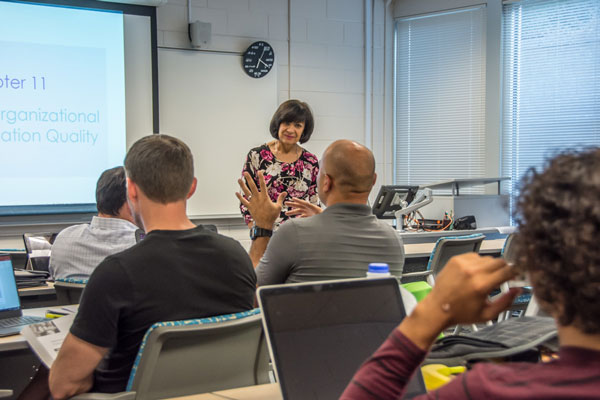The hours of academic work earn students their degree, but as graduates cross the stage to receive their diploma, it’s the late-night laughs in the library, the long conversations while walking around campus and the connections made through student involvement that represent their college experiences.

Dr. Dana Hall teaching an MBA course.
While college students across the country were forced by the response to COVID-19 to migrate to an online platform for learning, Reinhardt’s faculty and staff have worked tirelessly to capture as much of the in-person experience as possible.
Faculty and students may not be able to perfectly replicate the in-person classroom experience or control outside circumstances, but they are making strong efforts to make the best out of a situation that’s not just tough on everyone, but that’s affecting everyone differently.
Dr. Dana Hall, associate professor of business and coordinator of Reinhardt’s Master of Business Administration program, utilizes access to conferencing tools to simulate the face-to-face experience, hoping this helps students deal with social distancing as well.
“It’s an adjustment for everyone,” said Hall. “The students I teach have adjusted well to the new reality. It’s not the change that causes pain as much as it’s the resistance to change. Once we all realized that we had no choice, we accepted the change with grace. The faster we come to an acceptance of our new reality and how we can deal with it, the more quickly the pain diminishes.”
Hall, an expert in the communication and public relations field, knows the importance of face-to-face communication, which is why she has tried to incorporate as much virtual face-to-face teaching in her classes.
“The richest form of communication is face-to-face, and I believe that to be true for both students and business,” said Hall. “All other communication forms are less rich – nonverbal communication, which can tell you more than verbal, is absent. Also, we as human beings need and crave human contact.”
Dr. Jacob Harney, associate provost and dean of the School of Mathematics & Sciences, pays close attention to ensuring his students get the most out of the unplanned online learning experience. Harney utilizes Microsoft Teams, hosting meetings for class lectures and recording the meetings for reference, and by uploading additional resources. He also makes sure to check on students when they meet.
In his psychology class, Biology of the Brain, Harney assigned a paper covering how COVID-19 affected students’ lives in Spring 2019. Within 24 hours, Bailey Streid ‘22, a psychology major, turned in her assignment, which provided a platform for her to discuss her experiences.
Streid enjoyed the structured atmosphere on-ground classes provided her. Moving home and being forced to learn in an untraditional collegiate environment, she felt a sense of disorganization and stress related to her responsibilities. While home, she is taking classes online, working part time and caring for her grandparents.
“My biggest challenge with distance learning is maintaining my motivation to do my schoolwork, and also, I am easily distracted by my family – they need help often,” said Streid. “Being on campus gives me an opportunity to ask questions and be involved with other students, whereas being at home all the time is incredibly boring.
“I feel as though distance learning is far more difficult than being on campus because it is more demanding in time management and you don’t have the opportunity to meet professors face-to-face, which is something I value,” she added.
Business major Jernigan Tidwell ’21 also values the personal experience students receive in their classes at Reinhardt. Despite being unable to enjoy courses like choir during this time, Tidwell finds his professors adapted well to the online format.
“We are still meeting on online servers and using it to our advantage to make it seem as normal as possible,” said Tidwell. “I believed that the timelines would get thrown off, but Canvas has helped remind me to stay updated. We are still meeting in most of my classes, which gives a little more normalcy in the world of uncertainty that we are living in at the moment.”
While most traditional students didn’t sign up for online classes, they are finding themselves needing to adapt to ever changing situations – something employers value.
“Workplace flexibility means learning to be just as effective remotely as in traditional settings. Online learning has provided the unique experience in remote work effectiveness,” said Karen Mathews, director of Vocation & Career Services.
Nevertheless, students looking for the traditional college experience ultimately desire that learning environment and grow in that space more than others. Hall believes living and learning on campus develops a sense of independence.
“I also believe that the process of progressing through the different levels, from freshman to senior, is not just an academic process, but a maturation process. Many look forward to leaving the academic environment into the real world, perhaps with a sense of trepidation, but also with a sense of excitement and hope,” said Hall. “I remember having those feelings, and I graduated at a time when jobs were scarce.”
The plunge into distance learning may also create an added appreciation to students’ time on campus. While we wait for life to resume a sense of normalcy, there’s an element of this worldwide event that shows signs of our world never returning completely, developing a “new normal.” This “new normal” may contain new procedure, but if we allow it to happen, we could also develop an even greater value of the college experience.”

